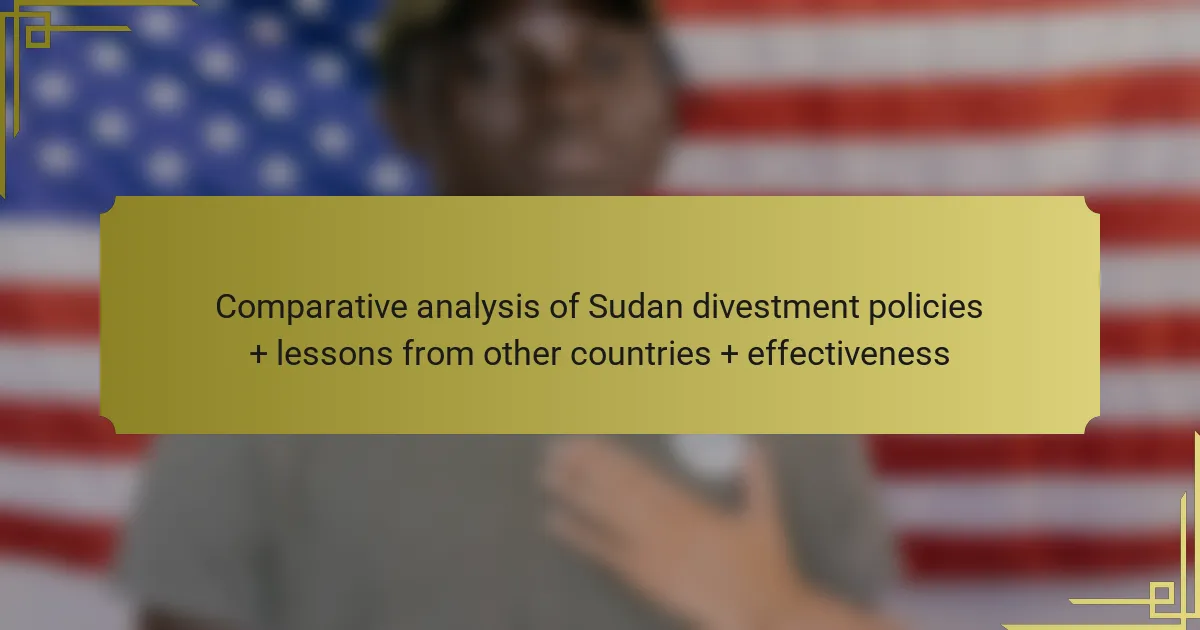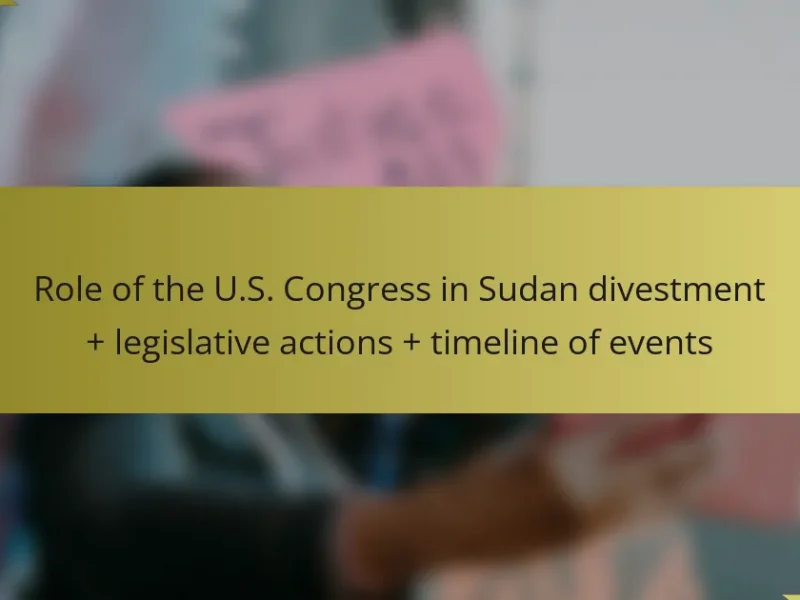Sudan divestment policies are legislative measures aimed at reducing financial connections with companies that support the Sudanese government, particularly in sectors associated with human rights abuses. These policies, enacted by states like California and New York, seek to pressure the government to improve its human rights record by mandating state pension funds to divest from implicated entities. The article analyzes the effectiveness of these policies, highlighting challenges such as weak enforcement and inconsistent compliance among international businesses. It also draws lessons from successful divestment experiences in other countries, emphasizing the importance of strategic planning, stakeholder engagement, and alignment with broader ethical goals. Ultimately, the article provides a comparative analysis of Sudan’s divestment strategies and their practical impact on foreign investments in controversial sectors.

What are the key aspects of Sudan divestment policies?
Sudan divestment policies primarily focus on reducing financial ties with entities that support the Sudanese government. These policies aim to pressure the government to change its practices regarding human rights and conflict. Key aspects include legislative measures that mandate divestment from companies involved in oil, military, and other sectors linked to human rights abuses. States like California and New York have implemented such laws, requiring state pension funds to divest from these companies. The policies also encourage private investors to withdraw from Sudan-related investments. Additionally, these measures are often part of broader sanctions imposed by the international community. The effectiveness of these policies is debated, with some arguing they have led to economic pressure on the government. However, critics claim that divestment alone does not significantly impact the political situation in Sudan.
How do Sudan’s divestment policies compare to those of other countries?
Sudan’s divestment policies are characterized by limited international engagement and economic isolation. In contrast, many countries implement more proactive and transparent divestment strategies. For example, South Africa’s divestment policies focus on ethical investment and social responsibility. This approach has resulted in significant international support and investment. Additionally, countries like the United States have established comprehensive sanctions that guide divestment from specific sectors. These policies often include clear guidelines and frameworks for compliance. Sudan’s lack of such structured policies leads to inconsistent application and reduced effectiveness in attracting foreign investment. Overall, Sudan’s divestment policies are less effective compared to the more structured and transparent approaches of other nations.
What are the historical contexts influencing Sudan’s divestment policies?
Sudan’s divestment policies are influenced by a complex historical context marked by civil conflict, economic sanctions, and international relations. The Second Sudanese Civil War, lasting from 1983 to 2005, led to significant internal strife and humanitarian crises. This conflict prompted international actors to impose economic sanctions, which hindered foreign investment.
Following the secession of South Sudan in 2011, Sudan lost a substantial portion of its oil revenues. This economic downturn exacerbated the need for divestment policies to attract foreign capital. Additionally, Sudan’s designation as a state sponsor of terrorism until 2017 further complicated its ability to engage with global markets.
The changing geopolitical landscape, including improved relations with the U.S. and the lifting of sanctions, has influenced recent divestment strategies. These historical factors collectively shape Sudan’s approach to attracting investment and managing its economy.
What are the main objectives of Sudan’s divestment policies?
The main objectives of Sudan’s divestment policies are to reduce foreign investment in sectors that support the government. These policies aim to promote human rights and alleviate economic sanctions. They seek to pressure the Sudanese government to change its policies and practices. Additionally, divestment aims to disrupt funding for conflict and violence in the region. By targeting specific industries, these policies intend to weaken the government’s financial base. The overall goal is to encourage political reform and improve the humanitarian situation in Sudan.
What challenges does Sudan face in implementing divestment policies?
Sudan faces significant challenges in implementing divestment policies. Political instability hampers consistent policy enforcement. Economic sanctions limit foreign investment and complicate divestment efforts. Corruption within governmental structures obstructs transparency and accountability. Limited access to international financial markets restricts Sudan’s ability to attract alternative investments. Additionally, lack of public awareness about divestment impacts the policy’s effectiveness. These factors collectively hinder Sudan’s progress toward successful divestment strategies.
How do political factors impact Sudan’s divestment policies?
Political factors significantly impact Sudan’s divestment policies. The Sudanese government often prioritizes political stability over economic reforms. This prioritization affects foreign investment and divestment decisions. Political conflicts can lead to sanctions, discouraging international companies from investing. For instance, the U.S. imposed sanctions due to human rights violations, influencing divestment strategies. Additionally, internal political dynamics can shift focus away from economic development. Consequently, divestment policies may reflect the government’s response to both domestic and international political pressures.
What economic implications arise from Sudan’s divestment strategies?
Sudan’s divestment strategies lead to significant economic implications, including reduced foreign investment and increased economic isolation. The divestment often results in a decline in capital inflow, as investors seek more stable environments. Additionally, Sudan faces challenges in accessing international financial markets. The loss of investment can exacerbate existing economic instability and hinder growth prospects. Historical data shows that countries with similar divestment strategies experienced prolonged economic downturns. These implications highlight the need for Sudan to reassess its approach to attract sustainable investment.

What lessons can be learned from other countries’ divestment experiences?
Countries that have undergone divestment often highlight the importance of clear policy frameworks. For instance, South Africa’s divestment from apartheid-era companies demonstrated the power of coordinated international action. This collective effort led to significant economic pressure on the apartheid regime. Additionally, divestment strategies in Norway have shown that transparency in investment practices enhances public trust and accountability.
Countries like New Zealand have also illustrated that engaging stakeholders can lead to more effective divestment outcomes. Their approach involved consultations with communities and investors, fostering broader support. Furthermore, the experiences of the United States in divesting from fossil fuels reveal that aligning divestment with broader sustainability goals can amplify impact.
Overall, successful divestment experiences emphasize the need for strategic planning, stakeholder engagement, and alignment with broader ethical and environmental objectives.
Which countries have successfully implemented divestment policies?
Countries that have successfully implemented divestment policies include South Africa, Norway, and Ireland. South Africa’s divestment from apartheid-era investments is a notable historical example. Norway’s government pension fund has divested from fossil fuels and companies linked to unethical practices. Ireland has passed legislation to divest from fossil fuel companies as part of its climate strategy. These examples demonstrate effective divestment strategies aimed at promoting social and environmental responsibility.
What strategies did these countries use to achieve success?
It is not possible to provide a definitive answer to the question regarding the strategies used by these countries to achieve success without specific country names or context. Each country’s strategies can vary widely based on their unique circumstances, policies, and historical backgrounds. Without this information, a concrete response cannot be formulated.
What common challenges did these countries face?
These countries faced economic instability and political unrest. Economic instability often resulted from fluctuating commodity prices. Political unrest frequently stemmed from governance issues and social discontent. Additionally, these nations encountered challenges in attracting foreign investment. Corruption and lack of transparency hindered economic growth efforts. Human rights violations also created international scrutiny and backlash. Lastly, inadequate infrastructure limited trade and development opportunities.
How do international reactions influence divestment policies?
International reactions significantly shape divestment policies by creating pressure on governments and corporations. When countries or international organizations condemn certain practices, it often leads to calls for divestment. For example, sanctions or public campaigns can prompt companies to withdraw investments to avoid reputational damage. Historical cases, such as the divestment from apartheid South Africa, show that global condemnation can lead to substantial policy changes. Moreover, international agreements and coalitions can unify efforts, amplifying the impact of divestment actions. This interconnectedness highlights the role of global opinion in driving local policy shifts.
What role do NGOs and advocacy groups play in these policies?
NGOs and advocacy groups play a crucial role in shaping divestment policies. They raise awareness about human rights violations and environmental issues. These organizations often mobilize public opinion and influence policymakers. For instance, campaigns led by NGOs can lead to significant divestment actions. Research shows that coordinated advocacy can amplify the impact of divestment efforts. In Sudan, groups like the Sudan Divestment Task Force have been instrumental in promoting sanctions. Their efforts have resulted in increased scrutiny of investments in the region. This demonstrates the power of civil society in driving policy change.
How can global cooperation enhance the effectiveness of divestment policies?
Global cooperation can enhance the effectiveness of divestment policies by creating a unified approach to financial disinvestment from targeted sectors. Collaborative efforts among nations can lead to standardized regulations and shared best practices. This can increase the pressure on companies to comply with divestment initiatives. For example, when multiple countries commit to similar divestment strategies, it reduces the risk of capital flight to jurisdictions with looser regulations. Additionally, global cooperation can facilitate information sharing about the impacts of divestment, leading to more informed decision-making. Countries that align their divestment policies can collectively amplify their influence over corporations. This collective action can result in greater accountability and transparency in the sectors being targeted for divestment. Historical examples show that coordinated international efforts, such as sanctions against apartheid South Africa, were more effective than isolated actions. Such precedents highlight the importance of global cooperation in maximizing the impact of divestment policies.

How effective are Sudan’s divestment policies in practice?
Sudan’s divestment policies are largely ineffective in practice. These policies aim to reduce foreign investment in sectors linked to human rights abuses. However, enforcement is weak, and compliance among international businesses is inconsistent. Reports indicate that many companies continue to operate in Sudan despite these policies. The lack of transparency and accountability further undermines their effectiveness. Additionally, the political instability in Sudan complicates the implementation of these divestment measures. Overall, while the policies exist, their practical impact is minimal as evidenced by ongoing foreign investments in controversial sectors.
What metrics are used to evaluate the effectiveness of Sudan’s divestment policies?
The effectiveness of Sudan’s divestment policies is evaluated using several key metrics. These metrics include economic indicators such as GDP growth rates and foreign direct investment levels. Monitoring changes in human rights conditions is also crucial. Additionally, the impact on domestic stability and security is assessed. The effectiveness can be measured by analyzing shifts in international relations and trade partnerships. Public opinion and civil society engagement provide qualitative insights into policy success. Finally, compliance with international sanctions and regulations is monitored to gauge policy adherence.
How has the effectiveness of these policies changed over time?
The effectiveness of Sudan divestment policies has fluctuated over time. Initially, these policies aimed to pressure the Sudanese government regarding human rights abuses. Early divestment efforts in the 1990s saw limited impact due to insufficient global participation. As awareness increased, particularly after the Darfur conflict escalated, more institutions adopted divestment strategies. By the mid-2000s, the effectiveness improved as coordinated efforts from multiple countries and organizations emerged. Recent evaluations indicate that while divestment raised awareness, it did not significantly alter government behavior. The lack of comprehensive enforcement mechanisms limited long-term effectiveness. Overall, the impact of these policies has evolved but remains constrained by geopolitical complexities.
What case studies illustrate the successes or failures of these policies?
Case studies illustrating the successes and failures of divestment policies include South Africa’s anti-apartheid movement and the recent divestment from fossil fuels. In South Africa, divestment from companies supporting apartheid led to significant economic pressure. This contributed to the eventual dismantling of apartheid in the early 1990s. Conversely, the divestment from fossil fuels has faced challenges. Some studies indicate limited impact on reducing carbon emissions. For instance, the Carbon Tracker Initiative reported that divestment has not significantly decreased the market value of fossil fuel companies. These examples highlight the complexities and varied effectiveness of divestment policies across different contexts.
What recommendations can improve the effectiveness of Sudan’s divestment policies?
Enhancing the effectiveness of Sudan’s divestment policies requires a multi-faceted approach. First, establishing clear regulatory frameworks can provide consistency and transparency for investors. This can be supported by international guidelines that align with global best practices. Second, engaging with stakeholders, including local communities and international organizations, can foster trust and collaboration. Third, implementing robust monitoring and evaluation mechanisms will ensure accountability and adaptability of policies over time. Lastly, leveraging lessons learned from other countries that successfully implemented divestment strategies can provide valuable insights. For example, South Africa’s divestment from apartheid-era investments showcases the importance of public awareness and mobilization.
What best practices from other countries can be adapted for Sudan?
Best practices from countries like Rwanda and South Africa can be adapted for Sudan. Rwanda’s post-conflict recovery model emphasizes community-driven development and reconciliation. This approach fosters social cohesion and economic growth. South Africa’s empowerment policies focus on inclusive economic participation. These policies aim to address historical inequalities. Implementing similar frameworks in Sudan could enhance local governance and economic opportunities. Evidence from Rwanda shows that community involvement leads to sustainable development. South Africa’s model demonstrates that inclusive policies can stimulate economic growth. Adapting these practices could help Sudan address its unique challenges effectively.
How can stakeholder engagement enhance policy effectiveness?
Stakeholder engagement enhances policy effectiveness by fostering collaboration and ensuring diverse perspectives are considered. Engaging stakeholders leads to increased transparency, which builds trust among affected communities. It allows policymakers to identify potential challenges early and adapt strategies accordingly. Research shows that policies developed with stakeholder input are more likely to be implemented successfully. For instance, a study by the World Bank highlighted that inclusive stakeholder processes improved the outcomes of development projects by 30%. Engaging stakeholders also promotes ownership, which encourages compliance and support for the policy.
What are the future prospects for Sudan’s divestment policies?
Sudan’s future prospects for divestment policies are contingent on political stability and international cooperation. Current divestment efforts are hindered by ongoing conflicts and economic challenges. Successful examples from other countries indicate that stable governance can enhance divestment effectiveness. For instance, South Africa’s divestment from apartheid-era investments led to significant economic reforms. Improved relations with international investors could strengthen Sudan’s divestment framework. Additionally, lessons learned from global divestment movements suggest that transparency and accountability are crucial for success. Therefore, the trajectory of Sudan’s divestment policies will depend on addressing internal issues and fostering external partnerships.
Sudan divestment policies aim to reduce financial ties with entities supporting the Sudanese government, focusing on sectors linked to human rights abuses. The article analyzes these policies in comparison to more effective strategies employed by countries like South Africa and Norway, highlighting historical contexts, objectives, challenges, and the role of international cooperation. Additionally, it examines the effectiveness of Sudan’s policies, suggesting improvements based on global best practices and emphasizing the importance of stakeholder engagement for future prospects.


